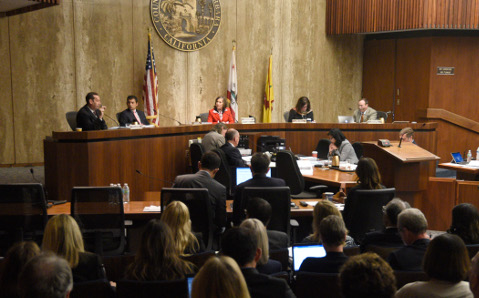Ideological Throw Down as County Supes Discuss Health Care
Political Rifts Underlined During Budget Discussion

The ideological red-blue divide was alive and kicking at the County Board of Supervisors’ special budget deliberations over the Department of Public Health Wednesday morning. The discussion started out as a recap of the impact of the Affordable Care Act — otherwise known as Obamacare — in Santa Barbara County. Supervisors heard that the percent of uninsured county public health patients dropped from 28 percent to 11 percent since the Affordable Care Act. They also heard that the number of individuals enrolled in Medi-Cal — under the expanded eligibility allowed by the Affordable Care Act — had increased from 13,000 to 24,000. And likewise, they heard that in each of the past three years, $100 million federal dollars coursed into Santa Barbara County as payments for Medi-Cal beneficiaries. Lastly, they heard that under the new guidelines, mental health treatment was now, in fact, covered.
Public health administrators bemoaned the sense of “uncertainty” hovering over the public health universe. Although Republican efforts to repeal and replace the Affordable Care Act famously flamed out a month ago, new changes are afoot that call into the question the basic rules of engagement. What range of benefits must insurance plans continue to cover? How will Medi-Cal payments be made in the future: based on actual cost of service or by statewide block-grants that peg payments to 1996 prices?
Andy Caldwell of COLAB — one of the county’s most tireless conservative watchdogs — argued that health care should be the domain of a private health-care system, not government agencies. Because governments are saddled with the high costs of government employee pensions, he argued, health-care consumers are saddled with costs they would not have to bear in a more private system.
Supervisor Das Williams jumped to defend the public health system, opining that Santa Barbara County health consumers have been harmed by the dearth of hospital competition. Health-care costs for Santa Barbara city employees who lived in Ventura rose 50 percent slower than health-care costs for city employees who live on the south coast, he noted. That, Williams attributed to lack of competition. If Santa Barbara still had a public county hospital — which closed its doors in 1978 — he argued, consumers would be better served.
Supervisor Janet Wolf said she found talk of privatization “disheartening” and took exception to those who believe government should disappear. “We have to exist,” she stated, otherwise the poor would not have access to care. The numbers, she argued, spoke for themselves — the number of uninsured county residents had dropped 18 percent since the Affordable Care Act passed.
Supervisor Peter Adam, an outspoken conservative and Trump supporter, prefaced his remarks, “I was going to shut up. I was trying to shut the hell up, but you pushed me.” He said that the Affordable Care Act was going to collapse under its own financial weight and described as “idiocy” the decision to replace and repeal it rather than repeal it outright. By eliminating the current system outright, he said, that would have forced to the “replace” bargaining table the myriad of stakeholders who’ve refused to join in. “I don’t know when we’re going to get serious about running this company as an ongoing enterprise,” he said.


